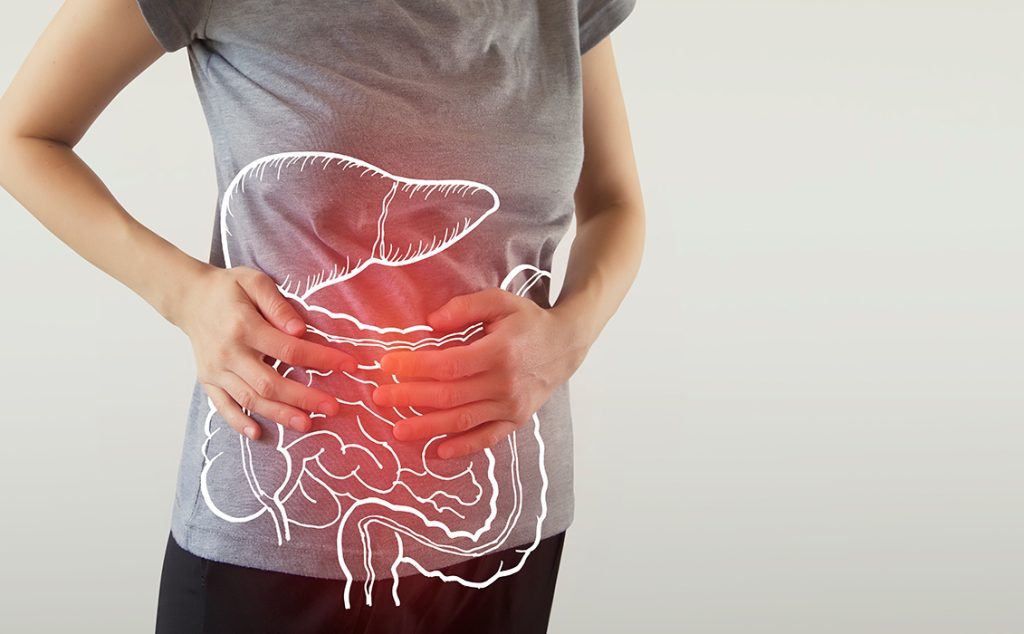Dr Philippa Kaye on Ulcerative Colitis

Dr Philippa Kaye explains what ulcerative colitis is and how it can be effectively treated.
Sometimes in my surgery I have a run of cases, where three or four patients in a row all seem to have the same symptoms or conditions. Previously I’ve written about Millie’s Crohn’s disease, and today I’m writing about a patient diagnosed with the other subtype of inflammatory bowel disease, ulcerative colitis (UC).
At 62, Hannah was fit and well until recently. She presented after two weeks of worsening abdominal pain and diarrhoea. Previously she opened her bowels every one to two days. The diarrhoea started as twice per day but had increased to eight to 12 times per day.
In the couple of days before she was seen she’d noticed blood in the stool, and had started to feel very unwell. She was feverish, couldn’t quite remember when she had last passed urine, and her home blood pressure machine was reading low numbers with a high pulse rate.
It was clear that Hannah needed to be seen in A&E and she was admitted to hospital for a few days for intravenous fluids and other treatment and was diagnosed with a severe flare of ulcerative colitis.
What is ulcerative colitis?
Ulcerative colitis is a condition which affects the lower part of the intestines – the large intestine (colon) and rectum, causing inflammation and ulcers can develop in the intestine which can bleed.
The condition can occur at any age, but is most likely to develop in those between 10 and 40 years old, though about 1 in 7 cases occur after the age of 60, like Hannah; and it affects about 2 in every 1,000 people in the UK. Interestingly, it seems to be commoner in non-smokers than smokers, but that is not an indication to start smoking as the risks of smoking to your health are high!
What causes ulcerative colitis?
The cause of ulcerative colitis is not known, there may be a family history which might indicate a genetic cause and it is thought that it might be an auto immune condition, where the body’s immune system mistakenly attacks healthy tissue.
What are the symptoms of ulcerative colitis?
The main symptom is diarrhoea, which may be mixed with mucous, pus or blood as well as abdominal pain. There may be urgency, when you are aware you must get to the toilet quickly but also tenesmus which is when you feel you need to go but nothing is there.
Hannah was also generally unwell in herself which occurs when a large part of the colon is involved, but in general the first episode is the most severe. The symptoms can range from mild to severe and flare ups can be frequent or rare. On average, about half of people with UC will not have symptoms, or will have mild symptoms in any year.
Approximately 1 in 10 people with UC will also have symptoms in other parts of the body such as a particular rash on the legs (erythema nodosum), mouth ulcers, inflammation of the joints and joint pain and inflammation in the eyes.
How is it diagnosed?
Generally ulcerative colitis is diagnosed on colonoscopy, where biopsies may be taken. The treatment can be given to treat an acute flare up but also prevent future flare ups and involves medications such as aminosalicylates such as mesalazine; steroids can also be given to reduce the inflammation. Other medications can be used to suppress the immune system to control symptoms and sometimes surgery is required if medications are not effective.
Ulcerative colitis and colon cancer
If you have ulcerative colitis there’s a higher risk of developing colon cancer, depending on how much of the colon is inflamed. Aminosalicylate medication such as mesalazine can reduce the risk. But due to the increased risk it is recommended that if you’ve had inflammatory bowel disease for 8-10 years, or it affects over a third of the colon, that you have regular colonoscopies. Biopsies are taken as well as chromoscopy where a dye spray is used to help show up suspicious changes.
The results are used to assess your risk of developing colon cancer so that timing of the next colonoscopy can be decided – sooner if you are at higher risk.
Advice given in this article and on the My Weekly website and magazines is not meant to replace personalised medical advice from your doctor. If you have any health concerns please see your doctor.
Article written on January 13, 2022; article reviewed and updated on July 23, 2024.
Each week we’ll ask Dr Philippa Kaye to talk about a prominent health issue, so look out for more articles in our health and wellbeing section in coming weeks. Read her advice on Pre-diabetes, Skin Cancer, Allergies, Parkinson’s Disease, Shingles, Ovarian Cancer, Endometriosis, Long Covid and Ticks and Lyme Disease.






